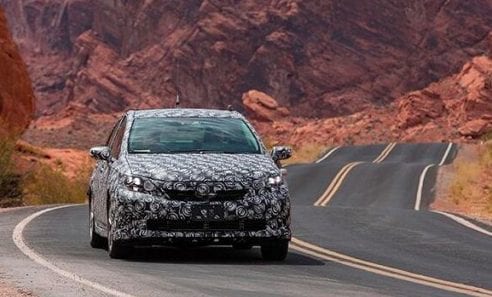Toyota announced the launch of a hydrogen-powered fuel-cell car in the U.S. next year on Monday at the annual Consumer Electronics Show (CES) in Las Vegas. The car, which resembles the popular Corolla, is yet to be named, but like the birth of a royal child it’s the pedigree that counts — and Toyota is the largest auto manufacturer in the world. However, unlike a royal child, hydrogen fuel-cell vehicles have been fighting an uphill battle against logistical, technological and economic odds since their inception.
 “For years, the use of hydrogen gas to power an electric vehicle has been seen by many smart people as a foolish quest,” Bob Carter, senior vice president of automotive operations for Toyota Motor Sales, said at the CES event. “Yes, there are significant challenges. The first is building the vehicle at a reasonable price for many people. The second is doing what we can to help kick-start the construction of convenient hydrogen refueling infrastructure. We’re doing a good job with both and we will launch in 2015.”
“For years, the use of hydrogen gas to power an electric vehicle has been seen by many smart people as a foolish quest,” Bob Carter, senior vice president of automotive operations for Toyota Motor Sales, said at the CES event. “Yes, there are significant challenges. The first is building the vehicle at a reasonable price for many people. The second is doing what we can to help kick-start the construction of convenient hydrogen refueling infrastructure. We’re doing a good job with both and we will launch in 2015.”
Calling it the “car of the future,” Carter said the vehicle will be a zero-emission, mid-size, four-door sedan with a driving range of at least 300 miles between refueling and a fill-up time of less than five minutes. No official price tag was announced, but it is estimated that the cost will range from $50,000 to $100,000.
“We aren’t trying to re-invent the wheel; just everything necessary to make them turn,” said Carter.
Not only does this include the technology inside the car, but also the infrastructure needed for refueling.
Hydrogen-powered fuel-cell vehicles run on hydrogen gas, making them similar to battery-only models such as the Nissan Leaf that plug-in to recharge in that they emit none of the tailpipe pollution association with burning gasoline. The only exhaust on the Toyota fuel-cell vehicle will be water vapor.
“Battery models carry electricity in their lithium-ion battery packs while fuel-cell vehicles make electricity on board in a chemical reaction between hydrogen and oxygen,” Bloomberg Businessweek reported. “While hydrogen vehicles have a range comparable to gasoline vehicles and need only a few minutes to refuel — compared with hours for most battery autos — there are few hydrogen pumps currently open to the public.”
To be precise there are currently nine hydrogen refueling stations open to the public, all of them in the Los Angeles metropolitan area, and another dozen in California that are private or for demonstration. For this reason the vehicle will initially launch in California — a state known for leading the nation in emissions standards and efficiency mandates. In 2012 the California Air Resources Board required that by 2025 one in seven new cars sold be zero-emission.
California has set aside more than $200 million to build another 20 hydrogen fueling stations by 2015 with as many as 100 possible within the next decade. Toyota has partnered with UC-Irvine to help determine the best locations for these fueling stations.
Addressing concern over the sparseness of refueling opportunities, Carter said, “Stay tuned, because this infrastructure thing is going to happen.”
South Korean automaker Hyundai also recently announced plans for a hydrogen-powered fuel-cell vehicle. Honda already has a fuel-cell car called the FCX Clarity that is available forlease primarily in Southern California.
A study from last year by the firm Lux Research found that, “The dream of a hydrogen economy envisioned for decades by politicians, economists, and environmentalists is no nearer, with hydrogen fuel cells turning a modest $3 billion market of about 5.9 GW in 2030.”
While hydrogen-powered cars will not likely make a significant automobile market impact or greenhouse gas emissions dent before 2030 as once hoped, production costs are rapidly falling and infrastructure is gaining steam.
So perhaps all the past hype about hydrogen-powered cars as a major mitigator of greenhouse gases can be replaced with a realistic goal of becoming a small part of the solution as some of the hurdles are overcome.
“We estimate a 95 percent cost reduction for the powertrain and fuel tanks of the vehicle we will launch in 2015 when you compare that to what it cost for us to build the original Highlander Fuel Cell in 2002,” Carter said at the CES event.










